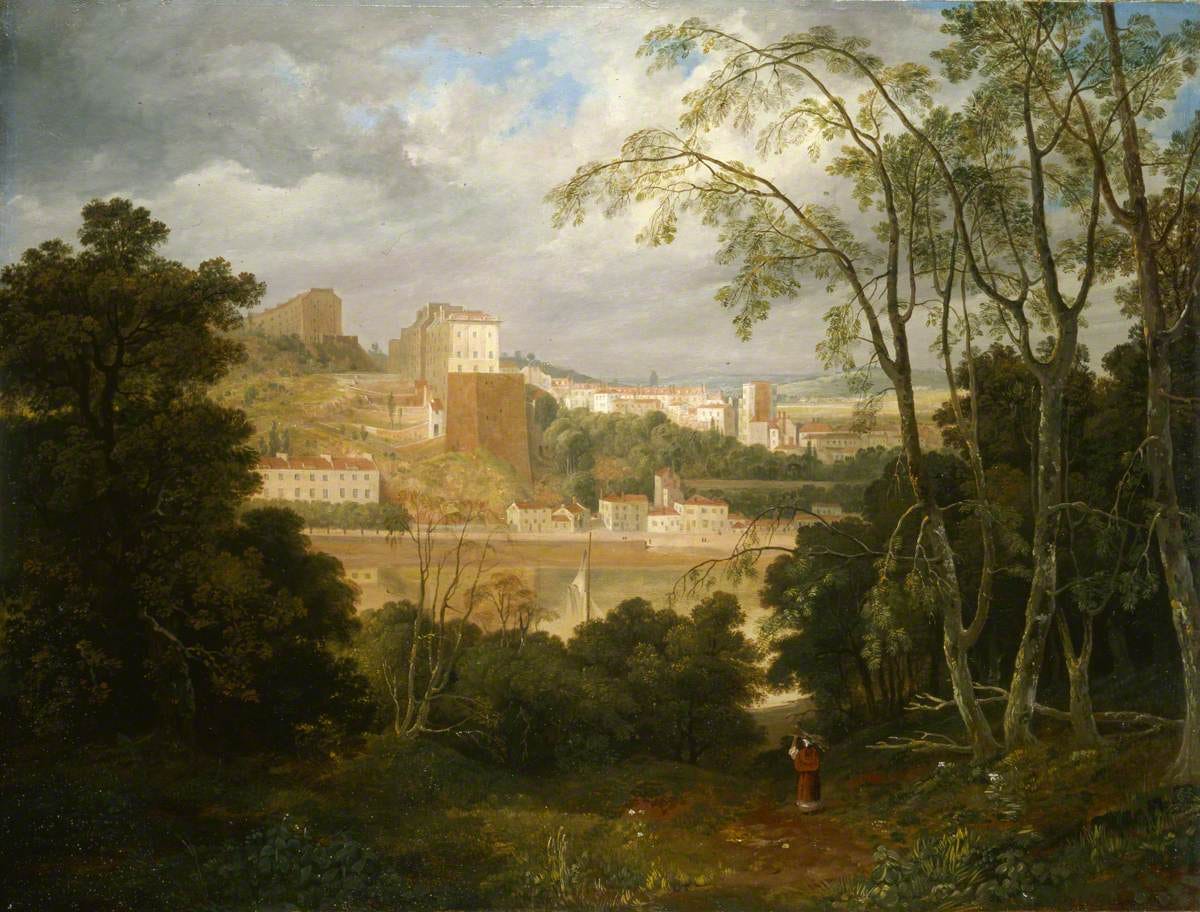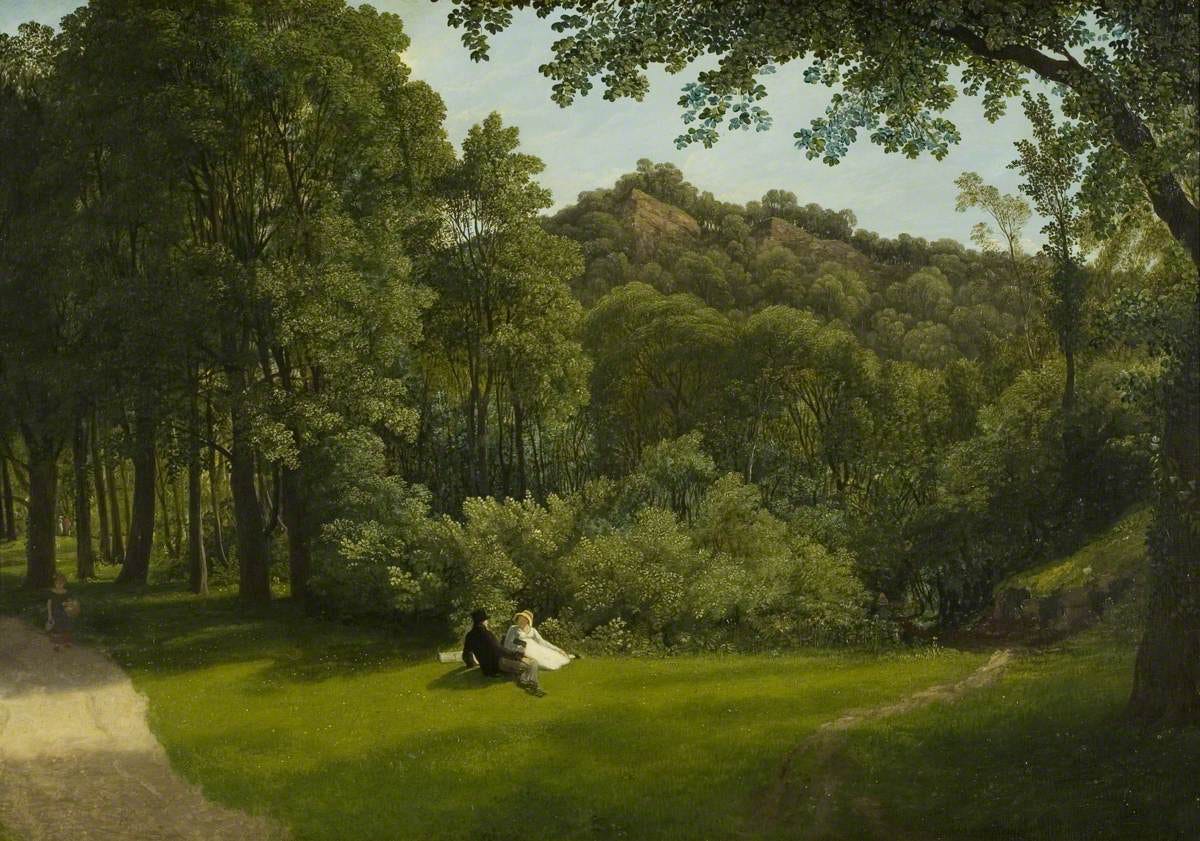
The Clifton Suspension Bridge opened in 1864 spanning the Avon Gorge between the busy, fashionable neighborhood of Clifton in Bristol and bucolic Leigh Woods.
In 1909, twenty-two year old Emily Hilda Young and her husband moved to Clifton. The neighborhood, the bridge, and the natural beauty on the opposite side of the river all made an indelible impression on Young who, in 1922, published the first of seven novels all set in Clifton which appears in her stories as the neighborhood of ‘Upper Radstowe.’
The bridge features prominently in the novels as a plot device moving characters between the city and the countryside. However, it’s also a suggestive image of the inner lives of Young’s characters—characters who are so often in a state of suspension.
Young creates characters who, while outwardly leading respectable and untroubled lives, are stuck between difficult choices or between the life they’re living and the one they idealize or between who they are and who they could be if they were free of their pride and insecurities.
Her characters often steal across the bridge from their lives in the city to dream or to seek the respite of anonymity for a few hours in the woods and farmland beyond. And as they physically move between two worlds, we see their faltering attempts to make sense of their lives and take some definite movement toward solid ground.
The last of E.H. Young’s Upper Radstowe novels, Chatterton Square (1947), is filled with many such characters set upon different paths but intermingling with one another and all mentally suspended in their discontents or daydreams. The novel centers on two neighboring families, the Frasers and the Blacketts, whose lives are slowly drawn together right before England enters the Second World War.
Rosamund Fraser is an attractive, lively woman who lives in the house that has belonged to her family for several generations. She and Fergus, her husband of over twenty years, have five children, all living at home though some are grown and working while others are still at school. When the Blacketts move across the street, they mistake her for being a widow, but in reality, Fergus has abandoned the family to live as a writer in France. Boarding with the Frasers is Rosamund’s childhood friend, the gossipy Miss Spanner.
Herbert and Bertha Blackett have been married as long as the Frasers and have three daughters. They appear to have an old-fashioned and peaceable marriage though it soon becomes clear that Bertha continually masks her true feelings toward her pompous husband.
The plot thickens when Piers Lindsay, Mrs. Blackett’s cousin, appears on the scene and becomes involved in the lives of both families. Piers was once a rival for Bertha’s affection, but she married Herbert when Piers was away fighting in France during the First World War.
Piers, who is now living as a farmer across the bridge, becomes the vegetable vendor to the neighborhood. He and Rosamund are drawn to one another, and when Fergus sends a letter requesting a divorce from Rosamund, she entertains the possibility of a future with Piers.
Piers signifies what might have been for Mrs. Blackett and what might be for Rosamund, and both women spend a great deal of time chafing against their current situations and reflecting on all the events that have brought them to the present moment.
The strength of Young’s writing is in the complexity of her characterization. Rosamund is experienced and wise enough to know that the idyll she dreams of would look quite different in reality:
A love affair between two middle-aged people was one thing…a marriage between them when one of them had a large family and neither of them had much money, was quite another thing, unfair to the children and a muddle that might even become squalid. What, she asked herself…did she and Piers imagine they were going to do? Did he intend to leave his holding and settle down to doing nothing in the Square, or was the family to be scattered?…she could not afford boarding-schools and she would be very dull among the cabbages and potatoes.
However, just after these reflections, in a very human moment, Rosamund is once more swept away by Piers’ presence: “When he stopped his car and she saw his odd face again and heard his voice…her doubts vanished…Somehow all the difficulties would be solved.”
Bertha Blackett, too, is a three-dimensional character, who doesn’t merely regret her marriage and wish she had waited for Piers to return from the war. If anything, the naïve marriage she made to Mr. Blackett has made her aware of how marriage, even to the best of men, would have its complications.
She was not married to him and if the chance was vouchsafed to her she would not have taken it. She would not have risked changing a perfect friend for an indifferent husband or even for a good one in whom the endearing little ways of a friend might become commonplaces or the source of unbearable irritation.
Yet Bertha does begin to wonder what life would look like if she dropped the retiring façade she wears in front of her family and were actually honest with her husband. She’s charmed with Mrs. Fraser whose identity hasn’t disappeared into the recesses of family life, and she sees in her a “sense of undiminished life.” The two strike up a friendship, much to Mr. Blackett’s annoyance.
Spinterish Miss Spanner, herself, once entertained the hope of marriage and a family. She has since spent a lifetime seeking meaning among her treasured books and furniture and vicariously through the lives of Rosamund’s children. In one of her pessimistic moods, she voices the sentiment that Rosamund or Bertha might feel, held fast as they are by familial ties: “I’m coming to the conclusion that the happiest people are the ones who have missed everything they thought they wanted.”
But Agnes Spanner, like Bertha and Rosamund, isn’t a one-note character, and she later lets “out a quivering sigh for everything she pretended she was glad she had missed.” It is Miss Spanner, too, who eventually encourages Rosamund’s adult daughter, Chloe, when she has doubts about marrying the dependable, if not exciting, accountant whom she loves. “Take your chance,” Miss Spanner tells her and then goes on to say, “If it’s perfection you’re after, you may as well realise that you’ll never get it, but I think you’re getting pretty near.”
Young offers no pat answers about relationships and discernment. She doesn’t adopt the confident tone of a 21st century think piece offering solutions to life’s difficulties. As Rosamund says, “Life is quite clear to some fortunate—or are they stupid?—people. I simply grope. I have to find my way by feeling and probably the way is wrong.”
For all the uncertainty and angst in the lives of Upper Radstowe’s residents, there is a persistent idea throughout that if they could but bridge the gulf of understanding that lies between themselves and those nearest them, then they might finally find contentment. They might make it to that solid ground.
When Rosmund’s son, James, tells her, “You understand people,” she responds, “Oh no James, I don’t. I should have to be God to do that.” In a certain sense she’s right. None of us can fully grasp the totality of another person. Yet so much of our incomprehension is self-made, as in the case of Bertha and Mr. Blackett. She never lets her true self be seen. He is so enamored of his own opinions that he can’t see himself or anyone else rightly. And so their marriage, which Mr. Blackett takes such pride in, is a farce.
But true friendship, that bridging of a gulf between two strangers, does exist or spring up, sometimes surprisingly, between different characters in the novel, and those friendships are all the more poignant for knowing that war may soon tear them apart.
And it is this idea that I come away most strongly with from Chatterton Square: that friendship, the experience of wholly seeing and being seen by another person, whether it’s in your marriage or with your children or with any of the people you live alongside, is a rare gift and what makes life bearable in this fragile world.
After Miss Spanner learns of Rosamund’s possible divorce, she runs, literally, into Chloe on the stairs. Chloe is going to see her mother and this exchange passes between them:
“Be kind to her,” Miss Spanner said.
“Why yes. But is anything the matter? Does she need kindness, specially?”
“We all do”
Indeed.
It’s impossible to do justice to Young’s novel in one short essay. Chatterton Square is teeming with the stuff of life—with its tangle of comic, frustrating, and illuminating moments. Young creates an extremely lifelike range of characters through whom the reader feels the trade-offs demanded in choosing one path over another. It’s a novel that deserves a place among the great marriage and family novels—up there with Anna Karenina, Pride and Prejudice, and Crossing to Safety.
Twentieth century women’s middlebrow fiction has its history of being overlooked and undervalued, but the ordinary lives that E.H. Young writes so extraordinarily about are the ones I find most resonant. Young herself expresses it best in a scene where Rosamund contemplates the stars in the night sky:
God, she thought, must have used a sort of pepper pot for placing these things he had created so lavishly, some of them closely clustered, others scattered as though in a last fling of the pot, and in comparison with the immensity in which they were poised she knew she was smaller than a speck of dust, she was invisible and yet that acceptance of her own importance did not make life less interesting or, at times, less painful.
Recommended for fans of Jane Austen, Anthony Trollope, Barbara Pym, and Elizabeth Taylor
In the future, I’ll consider turning on paid subscriptions. For now, if you’ve enjoyed this piece or any of my other writing and would like to make a one time donation, you can do so here:
And as always, sharing, leaving a comment, or subscribing is much appreciated.






Adding this to my TBR list. Thank you for being such a wonderful curator of books for women like me. 🙃
Yay! I've been looking forward to this. That first painting is so dramatic! That is so true about how Young uses the bridge in her novels. I'd never thought of that before. I so agree that this novel is right up there with other brilliant family/marriage novels. The Blacketts' marriage fascinates me. Mr. Blackett is such a typical Austen-type character with his complete inability to see reality. Young shows so well how he's always twisting the truth he receives to make it reflect positively on himself. Your point is so interesting that Bertha never lets herself be seen, so her position is a complex one. If she had let herself be seen early in her marriage, would it have done any good? Is her hiddenness her only good coping option? I also love the friendships that pop up unexpectedly. Though there's a lot in the novel that's somber, it still has a light feel to it. There are so many lovable characters.